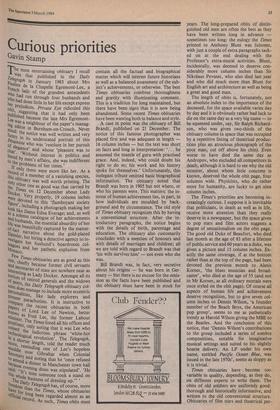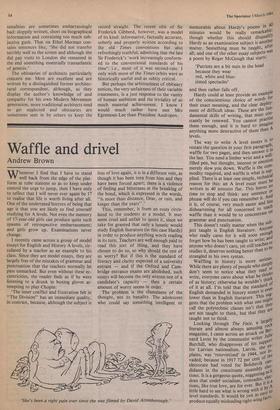Curiouspriorities
Gavin Stamp
The most entertaining obituary I recall
chat'. 'Without interest in politics and bored by men's affairs, she was indifferent to the problems of her times.'
If only there were more like her. As a record of a member of a vanishing species, this obituary was well worth printing. The Only other one as good was that carried by the Times on 12 December about Lady Docker. Very properly, 19 column inches were devoted to this 'flamboyant society figure', including a photograph making her look like Dame Edna Everage; and, as well as a solemn catalogue of her achievements and husbands, the essential absurdity of her life was beautifully captured by the matter- of-fact narrative about the gold-plated Daimler, ler, her hiring a detective agency to in- 1,estigare her husband's boardroom col- k,eagnes and her pathetic explusion from wionaco. Few Times obituaries are as good as this one, chiefly because former civil servants and secretaries of state are nowhere near as Interesting as Lady Docker. Amongst all its „snottices of retired generals and the widows "'II Peers, the Daily Telegraph obituary co.1- ,Inn does manage to include more eccentric Personalities, like lady explorers and
Pioneer parachutists. It is instructive to compare the recent obituaries in both
knows of Lord Lee of Newton, better _now s as Fred Lee, the former Labour minister. The Times listed all his offices and positions, only noting that it was Lee who olned the ludicrous phrase 'white-hot technological revolution' The Telegraph, a shorter length, told the reader much more, reminding one of Lee's hopeless muddle over Gibraltar when Colonial rj"rtarY and noting that he 'once refused attend a dinner in Manchester town hall Zu!e evening dress was stipulated'. 'He this 'It's time someone took a stand on hwhole business of dressing up." fre e DallY Telegraph has, of course, more have than the Times, whose obituaries v,ve.for long been regarded almost as an official record. As such, Times obits must was that published in the Daily Telegraph in January 1983 about Mrs Pauline de la Chapelle Egremont-Lee, a French lady of the grandest antecedents who had run through four husbands and who had done little in her life except express her prejudices. Private Eye ridiculed this obit, suggesting that it had only been Published because the late Mrs Egremont- L ee Was a neighbour of the paper's manag- ing editor in Burnham-on-Crouch. Never mind: the notice was well written and very funny in its understated portrait of this Petainiste who was 'resolute in her pursuit of elegance, and whose 'pleasure was to contain all the factual and biographical matter which will interest future historians as well as a balanced assessment of the sub- ject's achievements, or otherwise. The best Times obituaries combine thoroughness and gravity with illuminating comment. This is a tradition for long maintained, but there have been signs that it is now being abandoned. Some recent Times obituaries have been wanting both in balance and style.
A case in point was the obituary of Bill Brandt, published on 21 December. The notice of this famous photographer was placed first and was adequate in length 16 column inches — but the text was short on facts and long in interpretation: '... he assumed the mantle of guru with practised grace. And, indeed, who could doubt his right to do so; his work and his history spoke for themselves.' Unfortunately, this inelegant tribute omitted basic biographical information. The obituary noted that Brandt was born in 1905 but not where, or who his parents were. This matters: the in- terest of human achievement lies, in part, in how individuals are moulded by back- ground and by circumstance. The old style of Times obituary recognizes this by having a conventional structure. After the in- troductory paragraphs, the notice begins with the details of birth, parentage and education. The obituary also customarily concludes with a mention of honours and with details of marriages and children; all we are told with regard to Brandt was that `his wife survives him' — not even who she was.
Bill Brandt was, in fact, very secretive about his origins — he was born in Ger- many — but there is no excuse for the omis- sion as the facts have been published and the obituary must have been in stock for years. The long-prepared obits of distin- guished old men are often the best as they have been written long in advance sometimes too long: the eulogy the Times printed to Anthony Blunt was fulsome, with just a couple of extra paragraphs tack- ed on at the end dealing with the Professor's extra-mural activities. Blunt, incidentally, was deemed to deserve con- siderably more column inches than Sir Nikolaus Pevsner, who also died last year and who did much more than Blunt for English art and architecture as well as being a great and good man.
The length of obits is, fortunately, not an absolute index to the importance of the deceased, for the space available varies day by day and it is obviously rather bad luck to die on the same day as a very big name — to be squeezed under, say, Sir Ralph Richard- son, who was given two-thirds of the obituary column (a space that was occupied by a repetitive listing of theatrical produc- tions plus an atrocious photograph of the poor man, cut off above his chin). Even worse to have died the same day as Andropov, who excluded all competitors in death, although it is hard to see why the old monster, about whom little concrete is known, deserved the whole obit page, four columns wide. Physicists, who do rather more for humanity, are lucky to get nine column inches.
The Times's priorities are becoming in- creasingly curious. I suppose it is inevitable that politicians, in death as well as in life, receive more attention than they really deserve in a newspaper, but the space given to pop stars and film actors suggests a degree of sensationalism on the obit page. The good old Duke of Beaufort, who died last month at the age of 83 after a lifetime of public service and 60 years as a duke, was given a picture and 15 column inches. Ex- actly the same coverage, if at the bottom rather than at the top of the page, had been devoted the previous month to Alexis Korner, 'the blues musician and broad- caster', who died at the age of 55 (and not to Mr Korner, as all ordinary mortals were once styled on the obit page). Of course all aspects of human life and achievement deserve recognition, but to give seven col- umn inches to Dennis Wilson, 'a founder member of the Beach Boys, the American
pop group', seems to me as pathetically trendy as Harold Wilson giving the MBE to the Beatles. And the conclusion of this notice, that 'Dennis Wilson's contributions to the group included a series of sombre compositions, notable for imaginative
musical settings and suited to his slightly hoarse delivery. An LP under his own name, entitled Pacific Ocean Blue, was issued in the late 1970s', seems as sloppy as it is trivial.
Times obituaries have become too variable in quality, depending, as they do, on different experts to write them. The obits of old soldiers are uniformly good: thorough and historically informative, and written to the old conventional structure. Obituaries of film stars and theatrical per-
sonalities are sometimes embarrassingly bad: sloppily written, short on biographical information and containing too much sub- jective gush. That on Ethel Merman con- tains sentences like, 'She did not transfer terribly well to the screen and although she did pay visits to London she remained in the end something essentially transatlantic of genesis.'
The obituaries of architects particularly concern me. Most are excellent and are written by a distinguished former architec- tural correspondent, although, as they display the author's knowledge of and sympathy for his own Modern Movement generation, more traditional architects tend to get neglected and obituaries are sometimes sent in by others to keep the
record straight. The recent obit of Sir Frederick Gibberd, however, was a model of its kind: informative, factually accurate, soberly and properly written according to the old Times conventions but also refreshingly truthful, admitting that the late Sir Frederick's 'work increasingly conform- ed to the conventional standards of his time': i.e., most of it was second-rate. I only wish more of the Times orbits were as historically useful and as subtly critical.
But perhaps the arbitrariness of obituary notices, the very unfairness of their variable treatments, is a just response to the vanity of human ambition and the triviality of so much material achievement. I know I would much rather have met Mrs Egremont-Lee than President Andropov.











































 Previous page
Previous page